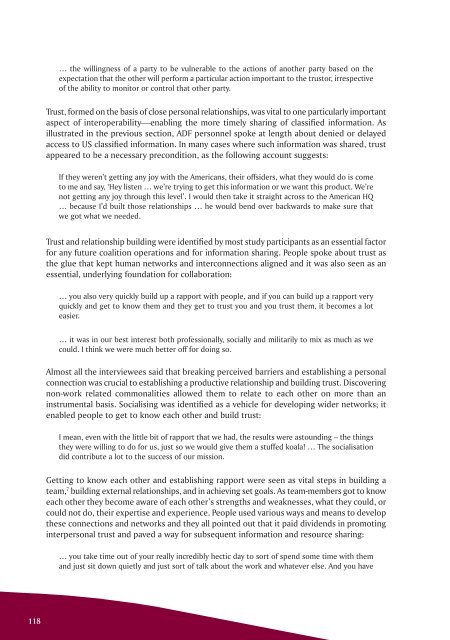ISSUE 176 : Jul/Aug - 2008 - Australian Defence Force Journal
ISSUE 176 : Jul/Aug - 2008 - Australian Defence Force Journal
ISSUE 176 : Jul/Aug - 2008 - Australian Defence Force Journal
Create successful ePaper yourself
Turn your PDF publications into a flip-book with our unique Google optimized e-Paper software.
… the willingness of a party to be vulnerable to the actions of another party based on the<br />
expectation that the other will perform a particular action important to the trustor, irrespective<br />
of the ability to monitor or control that other party.<br />
Trust, formed on the basis of close personal relationships, was vital to one particularly important<br />
aspect of interoperability⎯enabling the more timely sharing of classified information. As<br />
illustrated in the previous section, ADF personnel spoke at length about denied or delayed<br />
access to US classified information. In many cases where such information was shared, trust<br />
appeared to be a necessary precondition, as the following account suggests:<br />
If they weren’t getting any joy with the Americans, their offsiders, what they would do is come<br />
to me and say, ‘Hey listen … we’re trying to get this information or we want this product. We’re<br />
not getting any joy through this level’. I would then take it straight across to the American HQ<br />
… because I’d built those relationships … he would bend over backwards to make sure that<br />
we got what we needed.<br />
Trust and relationship building were identified by most study participants as an essential factor<br />
for any future coalition operations and for information sharing. People spoke about trust as<br />
the glue that kept human networks and interconnections aligned and it was also seen as an<br />
essential, underlying foundation for collaboration:<br />
… you also very quickly build up a rapport with people, and if you can build up a rapport very<br />
quickly and get to know them and they get to trust you and you trust them, it becomes a lot<br />
easier.<br />
… it was in our best interest both professionally, socially and militarily to mix as much as we<br />
could. I think we were much better off for doing so.<br />
Almost all the interviewees said that breaking perceived barriers and establishing a personal<br />
connection was crucial to establishing a productive relationship and building trust. Discovering<br />
non-work related commonalities allowed them to relate to each other on more than an<br />
instrumental basis. Socialising was identified as a vehicle for developing wider networks; it<br />
enabled people to get to know each other and build trust:<br />
I mean, even with the little bit of rapport that we had, the results were astounding – the things<br />
they were willing to do for us, just so we would give them a stuffed koala! … The socialisation<br />
did contribute a lot to the success of our mission.<br />
Getting to know each other and establishing rapport were seen as vital steps in building a<br />
team, 7 building external relationships, and in achieving set goals. As team-members got to know<br />
each other they become aware of each other’s strengths and weaknesses, what they could, or<br />
could not do, their expertise and experience. People used various ways and means to develop<br />
these connections and networks and they all pointed out that it paid dividends in promoting<br />
interpersonal trust and paved a way for subsequent information and resource sharing:<br />
… you take time out of your really incredibly hectic day to sort of spend some time with them<br />
and just sit down quietly and just sort of talk about the work and whatever else. And you have<br />
118

















